 icon.
icon.This topic provides a walk-through example of how to create a Ruled Surface in BobCAD-CAM. This topic is supplemental to Ruled Surface. This example also explains why to use Spline from Curves to improve Ruled Surface creation.
A BobCAD file installed with the software can be opened to follow along with this example.
1 In the File menu, click Open.
2 Navigate to: C:\BobCAD-CAM Data\BobCAD-CAM V**\Examples, and select Ruled Surface Example.bbcd.
3 With Ruled Surface Example.bbcd displaying in the File Name box, click Open.
In the example file, the geometry for the ruled surface is two 3D spirals (helices) that consist of many line segments. Ruled Surface uses two wireframe chains to create a surface with a linear connection between the chains. For the first part of this example we see the result of the spline curves made of line segments.
To open the Ruled Surface function, do one of the following:
 icon.
icon.
The parameters display in the ![]() Data Entry tab of the Data-CAM Tree Manager.
Data Entry tab of the Data-CAM Tree Manager.
1 Press and hold Shift and click the small line segment at the upper end of the helix.
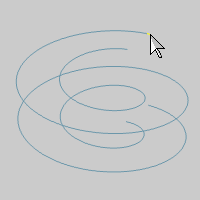
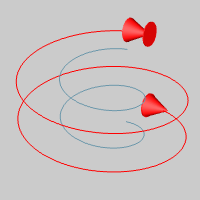
The start and end arrows display to show the first chain is selected.
2 Chain select the second helix using the same method. Be sure to click near the upper end of the helix to define the same chain direction as the first chain.
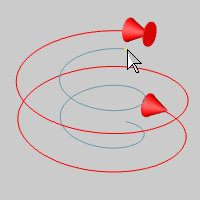
When you complete the second chain selection, the surface is automatically created.
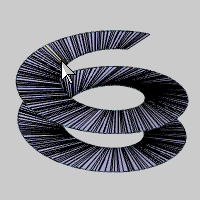
Notice the resulting surface is many small surfaces, one for each set of line segments in the two helices.
In order to create the surface as a single smooth surface, we use Spline from Curves to create a single entity from each helix.
3 First, to close the Data Entry Manager, click Cancel.
When you created the ruled surface, a feature was added to the CAD Tree.
4 In
the ![]() CAD Tree,
right-click
CAD Tree,
right-click  Ruled
Surface, and click Suppress/Unsuppress.
Ruled
Surface, and click Suppress/Unsuppress.
This is done to temporarily remove the surface from the workspace to make it easier to modify the input geometry.
1 In
the ![]() Layers Manager,
right-click
Layers Manager,
right-click ![]() Spline
and click Active Layer.
Spline
and click Active Layer.
This is done so the splines are created on a separate layer from the original helix geometry.
2 To enable selection mode, in the Edit menu, click Select Mode.
3 Drag a window to select both helices in the Workspace.
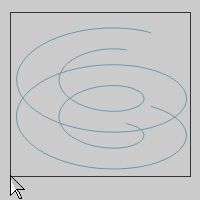
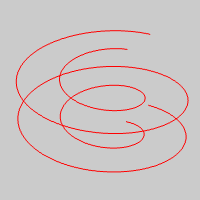
4 In the Splines menu, click Approximated.
The spline curves are automatically created using the preselected chains. This results in two single-entity spline curves.
5 To close the Data Entry Manager, click Cancel.
6 In
the Layers Manager, right-click
![]() Wireframe
and click Hide to hide the original
helices.
Wireframe
and click Hide to hide the original
helices.
1 In the CAD Tree, click Ruled Surface, and notice that the original surface highlights in the Workspace.
2 Right-click Ruled Surface, and click Suppress/Unsuppress.
3 Expand the feature to see the geometry items below it.
4 Below
 Ruled Surface,
right-click
Ruled Surface,
right-click ![]() Edge,
and click Re/Select.
Edge,
and click Re/Select.
In the Workspace, chain select the spline curve.
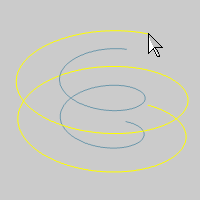
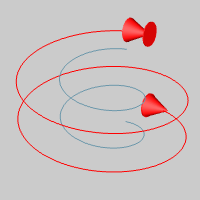
Notice this time that as you select the helix, it is a single entity.
To confirm the selection, click ![]() (OK).
(OK).
5 Right-click
the other ![]() Edge
item, and click Re/Select.
Edge
item, and click Re/Select.
Chain select the second spline curve using the same direction as the first.
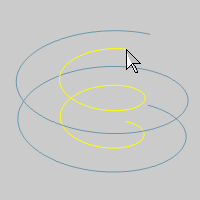
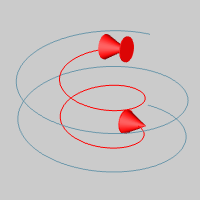
To confirm the selection, press Spacebar.
6 When you confirmed the selection, the Ruled Surface feature was automatically rebuilt.
To rebuild a feature manually, you right-click the feature name, and click Rebuild.
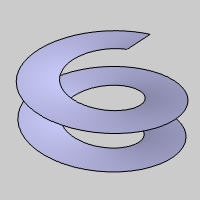
Notice the significant improvement in the Ruled Surface as a result of creating the spline curves. The surface is now a single entity. This method can often be used to improve the result of a Ruled Surface when using complex wireframe input geometry, especially when the chains don't contain the same number of entities.
This concludes the example.